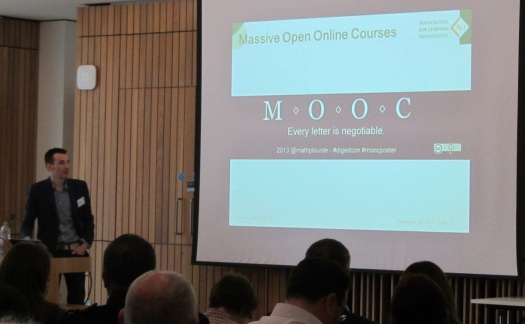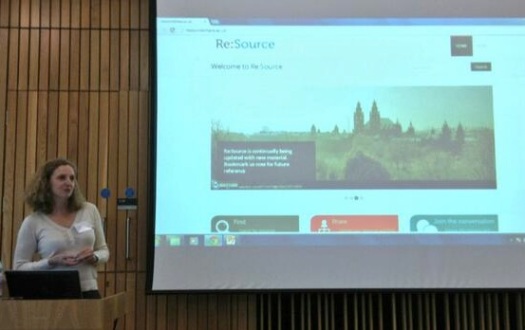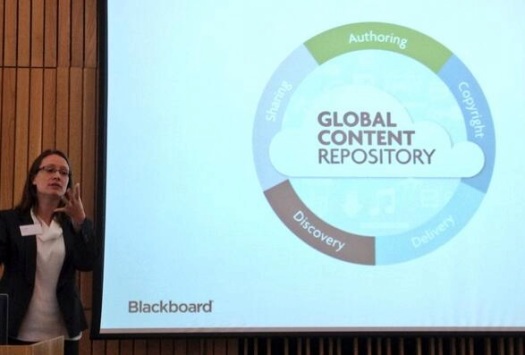Earlier this week I was invited by Jisc RSC Scotland to attend their Open Education Joint Forum which took place at the Informatics Forum at the University of Edinburgh. It was a very well attended event that featured a packed programme of thought provoking and engaging presentations that highlighted a range of really inspiring open education developments. I’ve put together a storify of the event’s lively twitter back channel here and links to all the presentations are available from Jisc RSC Scotland here.
Open Scotland
Lorna M Campbell, Cetis and Joe Wilson, SQA
I kicked of the event with a short overview of the Open Scotland before passing over to Joe who challenged the audience to share their educational resources, before talking about about the benefits of openness and calling for changing mindsets around Open Education. Joe also reminded us that there is a real strength in Scottish education, we have dedicated and talented teaching staff and by opening up education they can shine for learning.
Massive Open Online Courses: Open education of course?
Martin Hawksey, ALT
Martin Hawksey, my former Cetis colleague, now with ALT, gave an inspiring presentation that placed MOOCs in the historical context of technology innovation and asked if we are now in danger of promoting a dogmatic approach to programming and technology innovation. Martin revisited Doug Englebart’s “Mother of All Demos” which, among many other innovations, demonstrated screen sharing and videoconferencing as far back as 1968. In education we have a tendency to get stuck in particular ways of doing things, both students and teachers have specific expectations and can be very resistant to change.
Martin highlighted some of the tools, services, platforms and applications that can be employed to deliver MOOCs. He also reminded us that every letter of MOOC is negotiable and suggested that the issue of MOOC completion rates is irrelevant. Open or closed is not a binary thing, but there are huge benefits to moving towards more openness. Martin concluded by telling is all that “openness is about feeling warm inside” and that we should all “ride the waves of innovation to a more open, more relevant style of education’. Martin has written a an excellent blog post about his presentation which you can read here: Taking on the dogmatic approach to education with a bit of ‘reclaim open digital connectedness’.
Re:Source OER Repository
Garry Cameron, Scotland’s Colleges, Jackie Graham and Sarah Currier, Mimas
Gerry spoke about the need to change hearts and minds to use and develop open educational resources and called for a clear statement and a decisive stance on open educational resources from Scottish Government. Scotland’s Colleges committed to releasing resources under Creative Commons licences.
Re:Source is an OER repository for Scotland’s colleges. The open platform is here and could be used by many across the Scottish education sector but policy drivers needed. Jisc RSc Scotland is collaborating with Scotland’s Colleges to work ona way forward. Librarians also have a crucial role to play in developing open repositories within Scotland’s colleges. Jackie Graham went on to demonstrate the Re:Source repository before handing over to Sarah Currier who spoke about the Jorum repository which powers Re:Source.
Blackboard xpLor
Julie Usher, Blackboard
Julie Usher began by highlighting the potential of OERs but suggested that they can be hard to find; how do you fin and evaluate OERs, link them to curricula, including assessments. To address this problem Blackboard have developed the xpLor content repository. xpLor supports OER discover and allows content to be pulled directly into Blackboard courses. Creative Commons is baked into xpLor repository so content can be exported with CC licenses.
Introduction to Open Badges and OBSEG
Grainne Hamilton, Jisc RSC Scotland
Open badges are a form of digital accreditation that can be displayed online. Badges are like coats of arms, they are images that contain information and have meaning beyond the visual. Open Badges incentivise informal, formal and work based education and break learning into manageable chunks. The Open Badges in Scottish Education Group (OBSEG), which is supported by Jisc RSC Scotland, has set up three sub-groups focusing on Learner Progress, Technology and Design and Staff Development.






